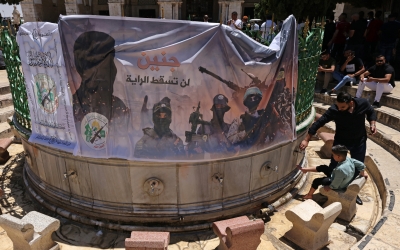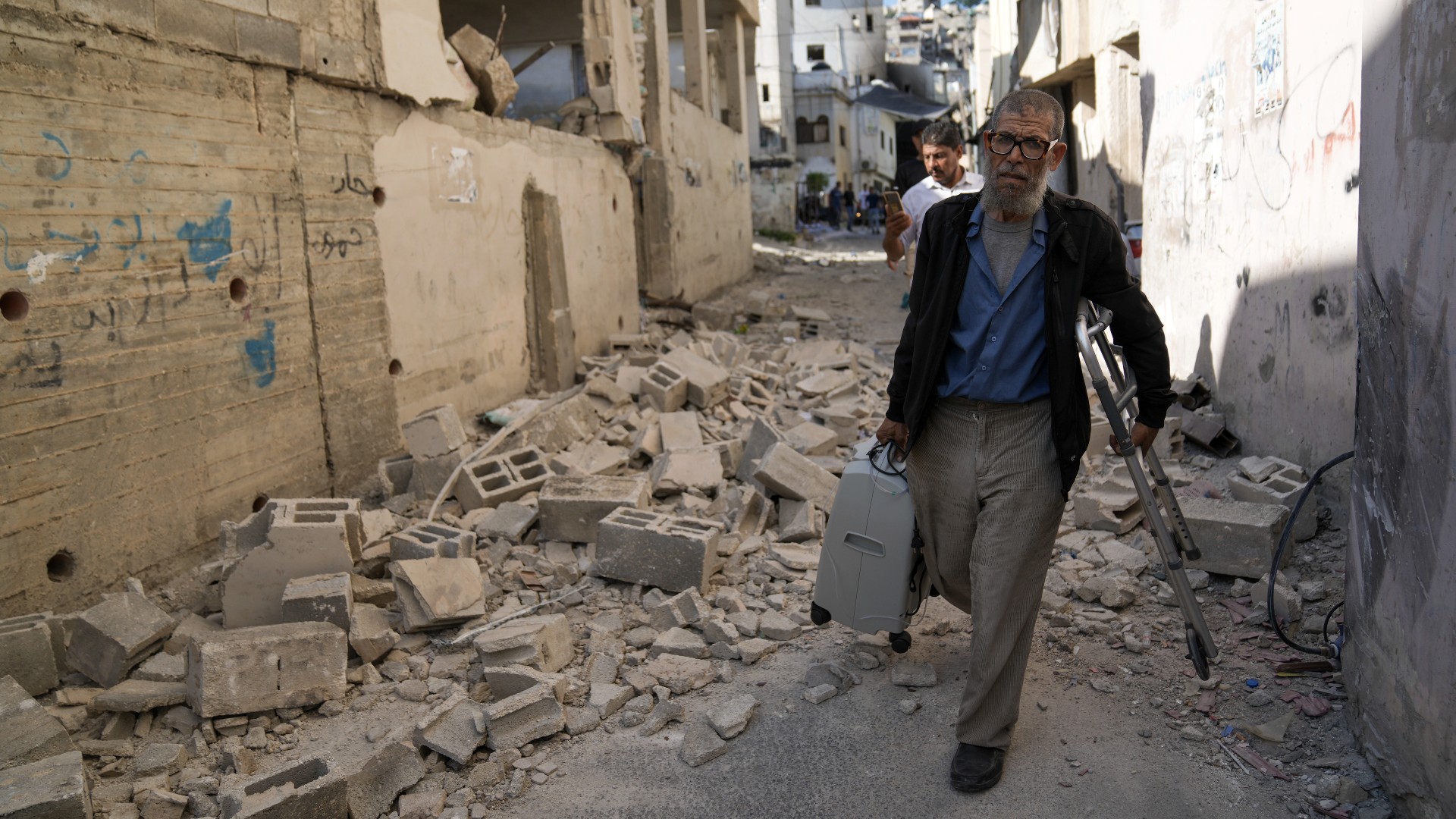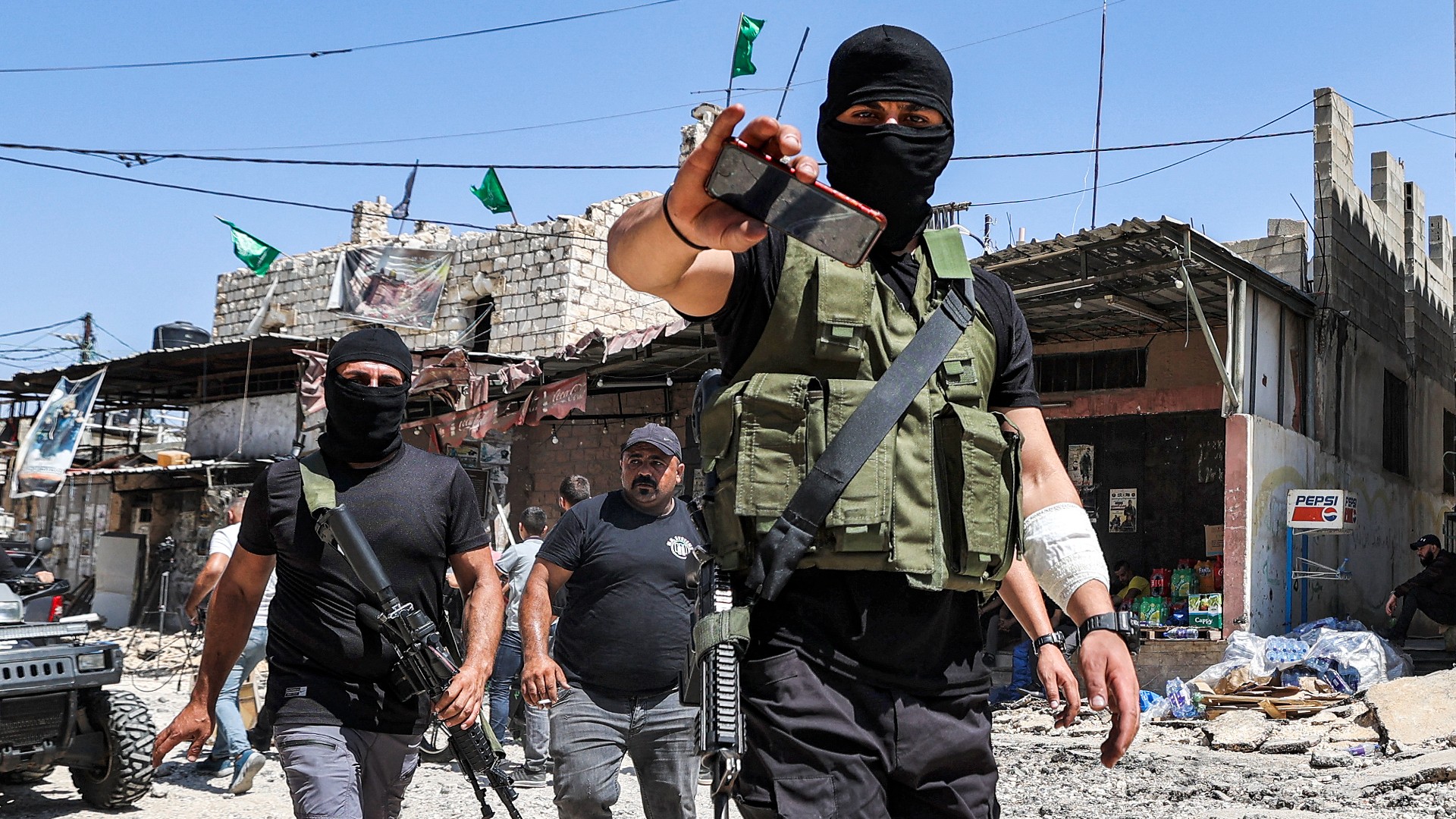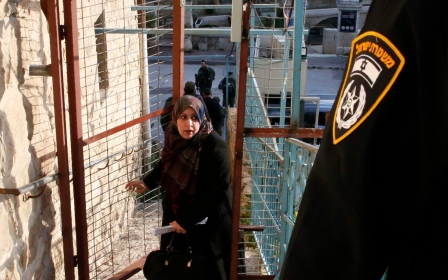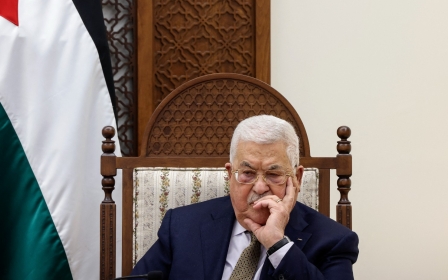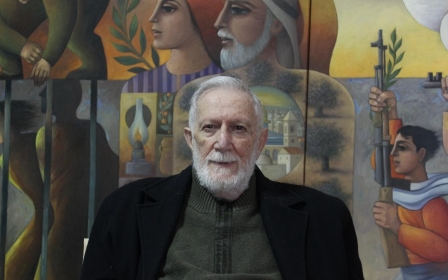Jenin: Abbas finds no love during visit as PA is accused of abandoning resistance
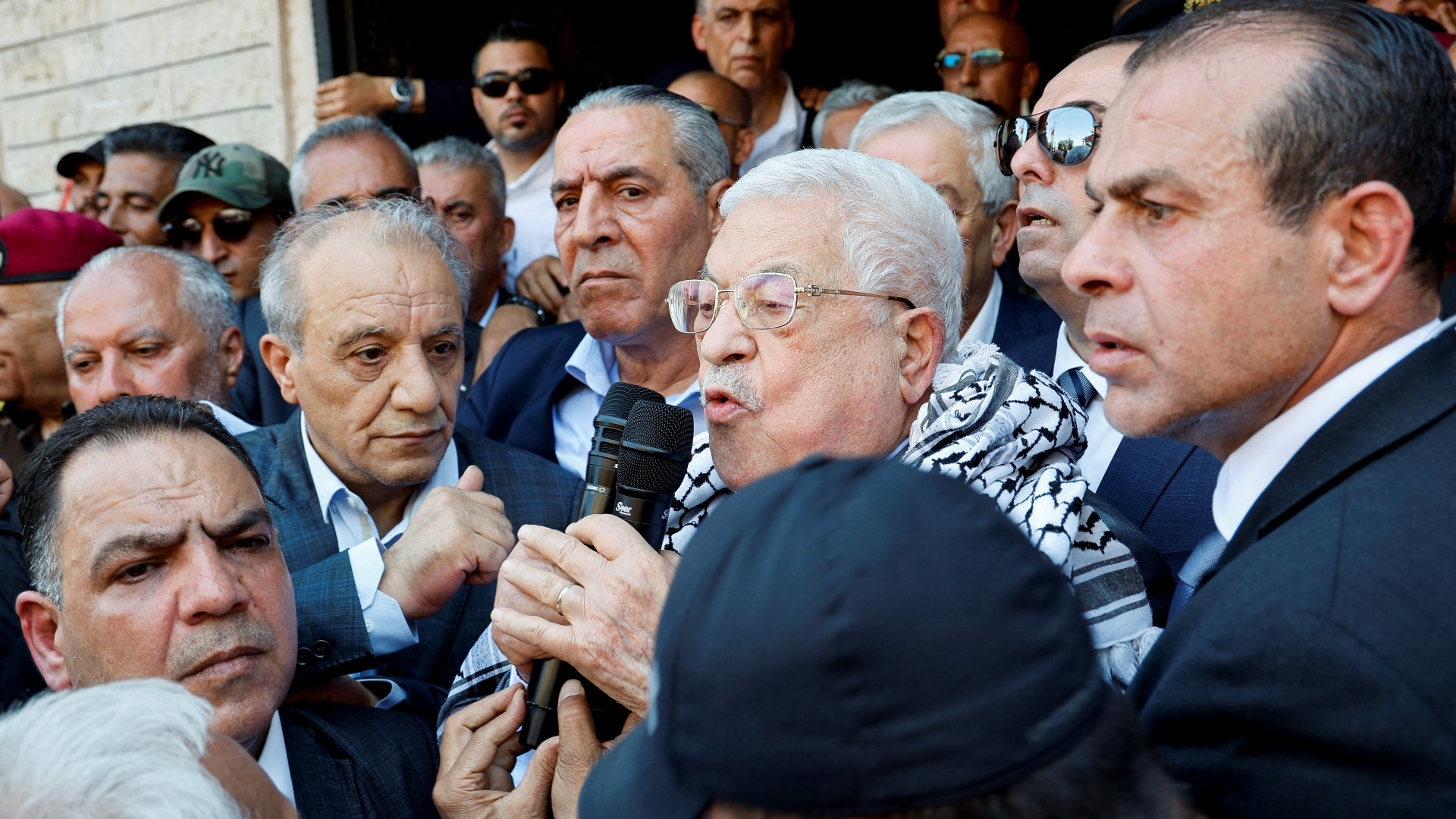
Palestinian President Mahmoud Abbas took just an hour to survey Jenin.
His excursion, Abbas’s first to Jenin in 11 years, came in the wake of a calamitous Israeli offensive on the city in the occupied West Bank’s north, which caused huge and widespread damage.
Using bombs and bulldozers, Israeli forces charged into Jenin on 3 July, levelling much infrastructure in its refugee camp, which 14,000 Palestinians call home, and killing 12 people.
Jenin is a two-hour drive from the Palestinian Authority’s headquarters in Ramallah. Abbas took a Jordanian helicopter.
Initially, his itinerary included multiple stops. In the end, Abbas’s visit on Wednesday was limited to an area on the edge of the camp and Jenin’s national security headquarters.
New MEE newsletter: Jerusalem Dispatch
Sign up to get the latest insights and analysis on Israel-Palestine, alongside Turkey Unpacked and other MEE newsletters
The Palestinian Authority (PA) declared that the 87-year-old president was travelling to the city to scrutinise the living conditions of its residents and oversee the ongoing reconstruction efforts in Jenin and its camp.
Yet he never got further than the camp’s entrance - arches adorned with images of slain fighters who have taken Palestinian resistance into their own hands in recent years.
Against this backdrop, he delivered a speech that was inaudible to the majority of the hundreds that gathered there to hear him.
'I am indifferent'
What could be heard instead were chants from the crowd of “brigades, brigades”, a reference to the Jenin Brigades resistance group that has grown in prominence over the past year and been a thorn in the Israeli occupation’s side.
Commentators preferred to cast Abbas’ visit not as a fact-finding mission as the PA did. Rather, it has been perceived as an effort by the Palestinian Authority to burnish its image and placate the ire of Jenin residents furious about the way Palestinian security forces melt away when Israeli forces storm their homes.
'They [PA] abandoned us amidst the bombardment'
- Jenin resident
This fury came to the fore on 5 July, when the camp's residents ousted PA representatives and a delegation from Abbas’ Fatah movement, which dominates the Palestinian Authority, from a funeral procession for the people killed by the Israeli offensive.
Ever since the Israeli troops withdrew from the camp, a palpable anger at the PA, its institutions and its security apparatus has surfaced. This sentiment has been echoed by every Jenin resident Middle East Eye spoke to following the raid. "They abandoned us amidst the bombardment,” said one.
A week later, as the city prepared for Abbas’ visit, little had changed.
Palestinians voiced their dissatisfaction with the PA’s performance during, after, and even before the Israeli offensive.
Damj is a neighbourhood of Jenin’s camp, which hosts Palestinians expelled from their homes in what is now Israel during the 1948 Nakba. It was one of the most heavily targeted areas during the Israeli raid. Three Palestinians were killed there, and its al-Ansar Mosque came under heavy siege.
Fathia Yusuf, a 50-year-old Damj resident, was forced to flee her home during the offensive. Her home was turned into a sniper’s nest by Israeli forces, leading to considerable destruction.
When asked about Abbas’ impending visit, she simply replied: “I am indifferent.”
Yusuf told MEE that the president’s presence in the camp had no consequence for her. In her view, the PA, which failed to safeguard them during the offensive, cannot be expected to provide them any protection in the future either.
As MEE headed to the nearby district of Fallujah, a young man, who preferred to remain anonymous, walked alongside.
He joked that he had mementos from every major Israeli offensive on Jenin: an injury to his left eye from the famously bloody raid in 2002; a wounded leg in last week’s incursion.
Gesturing towards the array of tightly packed concrete houses, the man said PA security forces have harmed and detained many of the youth that live there.
This, he said, only leads to residents viewing Abbas’s visit with displeasure.
"We are hopeful that this visit passes peacefully and does not pave the way for an unwelcome security clampdown on the camp," he said.
Palestinian security forces, set up under the PA as part of the Oslo Accords, police the local population but do nothing to protect them from Israeli forces (with which they share coordination) or settler attacks.
Their objective is to keep calm across the West Bank. But in Jenin, which has a history as a hotbed of resistance, the youth have succeeded in fostering a more restive environment.
'Those who fall short in providing protection and aid amid bombardment from the occupiers cannot be expected to offer us support now'
- Mohammed, Jenin
Fallujah resident Mohammed, 35, strolled past carrying an assault rifle.
"The president's visit lacks significance to us," he said. "Those who fall short in providing protection and aid amid bombardment from the occupiers cannot be expected to offer us support now.”
Mohammed said the PA’s failure goes beyond its inability – or lack of will – to defend Palestinians against Israeli attacks. It is failing its people by trying to contain the camp’s resistance movement.
Last year, he said, Mohammed was arrested by the PA and accused of participating in activities against the Israeli occupation.
"Our expectation is one of support and protection, yet we confront a reality starkly opposed to that. We find ourselves not shielded, but pursued by security forces, even when we are the protectors of the entirety of our camp," he said.
Bearing the scars
Exiting Fallujah, MEE entered the Jabal neighbourhood - which as its name (mountain in Arabic) suggests, is the highest point in the camp.
Here, young men busied themselves with cleaning the neighborhood's streets and alleys.
An armed man appeared. Residents said he was a member of the Martyrs of al-Aqsa Brigades, the military arm of Abbas’s Fatah movement.
He declined to speak, citing a meeting with Abbas’ security detail he had to attend ahead of the president’s visit.
In Jabal, the home of Maher Mari bears the scars of last week’s raid. Two of the 55-year-old’s sons were arrested by Israel during the offensive.
Correctly, as it turned out, Mari doubted Abbas would brave visiting the camp’s heart.
"During the incursion, the president remained absent not only from our lives, but also from our television screens, failing to denounce the atrocities committed in the camp. Given this stand, how are we to place our trust in this visit?" he asked.
Nearby in Jabal, MEE met another fighter who was a chief target for Israeli forces when they attacked the area last week.
He expressed his dismay at the PA’s efforts to dismantle the resistance movement in Jenin, citing the example of two fighters who the security forces detained as they made their way to the camp to help during the Israeli offensive.
"Stop pursuing us," he said he wanted to tell the PA.
The fighter preferred to remain anonymous, but said he was affiliated with Saraya al-Quds, the military wing of the Palestinian Islamic Jihad movement, and a member of the Jenin Brigades.
He said the PA was not only trying to contain the work of fighters affiliated with Islamic Jihad and Hamas, but all factions, including Fatah.
"Given these circumstances, how are we to harbour affection and trust for them?" he asked.
However, he was quick to add there was no prospect of the fighters confronting the PA’s security forces.
"Their antagonism isn't a phenomenon of the recent incursion," he said. "These forces operate against us consistently."
A vision of unified governance
For those who were able to hear Abbas’ speech, this tension between expectations and deliverance, and the PA’s targeting of Jenin’s renewed resistance movement, were palpable.
Abbas invoked a vision of unified governance - speaking of a singular authority, one state, a common law, and a shared sense of security and stability.
He made a stark reference to "severing the hand that disrupts the unity of our people and their security", even as he expressed gratitude to all those who lent their support to Jenin and its refugee camp.
Khalil Shaheen, a political analyst, told MEE the president’s visit was necessary, and an attempt to diffuse the rage stemming from the PA’s perceived inaction and delays during the assault.
Yet the PA and Abbas had made no real progress in winning people over on Wednesday, he said.
Shaheen added: "The president's speech merely served to articulate his position, asserting a staunch refusal of any armament beyond the recognised weapons of the authority, and notably lacked any acknowledgment or gratitude for the resistance fighters whose valiant efforts were put forth in the defence of the camp and city."
Middle East Eye delivers independent and unrivalled coverage and analysis of the Middle East, North Africa and beyond. To learn more about republishing this content and the associated fees, please fill out this form. More about MEE can be found here.


